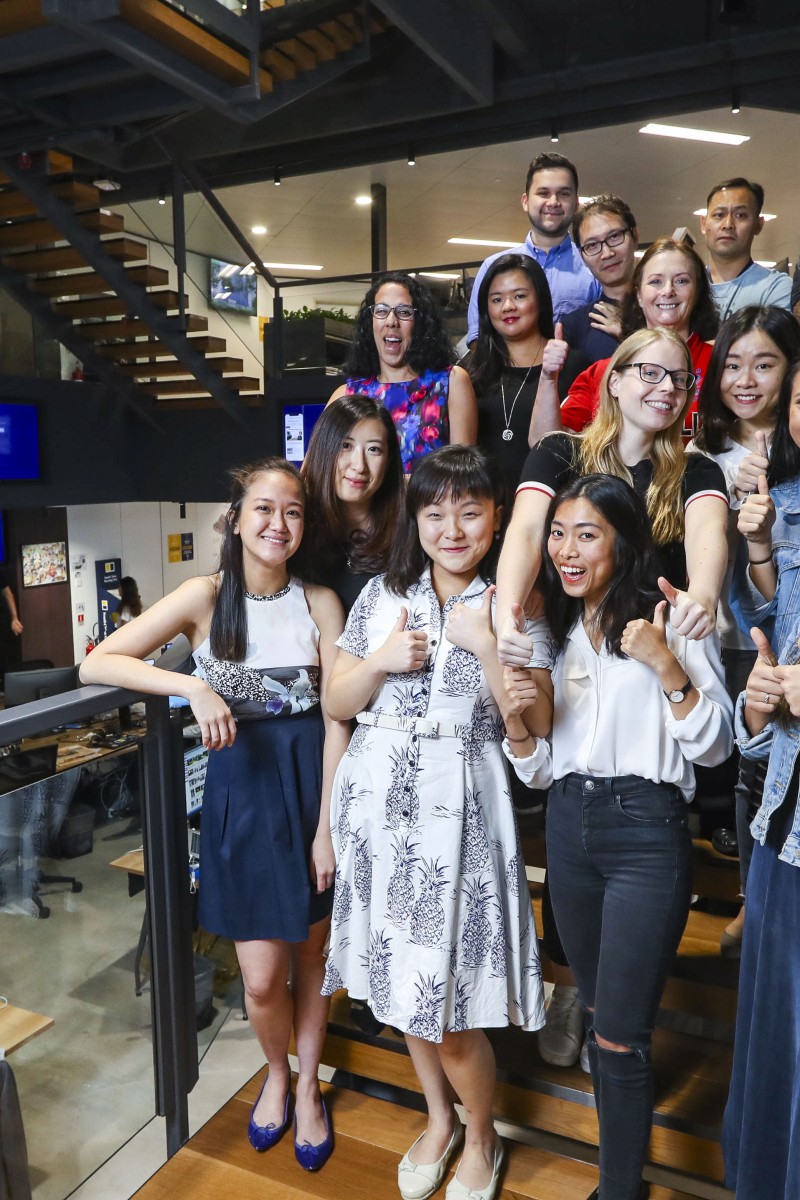
SCMP 115th Anniversary x Young Post: Giving Hong Kong teens a voice
With a motto of "Your heroes, your stories, your news, on your desk", Young Post is the go-to place for teen issues in the city
 The Young Post team is dedicated to giving Hong Kong teens a voice.
The Young Post team is dedicated to giving Hong Kong teens a voice.Giving a voice to the city’s youngsters
Youth engagement has long been important to the South China Morning Post. It published Children’s Corner – its first youth supplement – on March 11, 1951, as a Sunday feature, then launched Young Post-Herald, also on Sundays, on January 7, 1968. This was the forerunner of today’s Sunday Young Post.
The Post has also been at the forefront of introducing news and journalism to the youth of Hong Kong. On September 9, 1985, the current incarnation of Young Post was first printed, and now reaches tens of thousands of teenagers, landing on school desks on weekdays as a supplement to the main paper.
While youngsters might be deterred from reading about adult affairs in a formal news tone, Young Post gives them a wider perspective. Its motto of “Your heroes, your stories, your news, on your desk” ensures that instead of merely being a pale reflection of the adult newspaper, it seeks its own stories about teenagers, school life, sports stars and entertainment while keeping students up to date on local, regional and international events.
At the same time, it has become a staple for educators to use as an English-language teaching tool, with content that spans the range of school needs.
Teenagering is tough. One moment young people are treated as children, and the next moment they are expected to behave like adults. Hong Kong, for all its advanced technology, safety and world-class education, places an extraordinary amount of pressure on young lives.
Over the years, Young Post has become a friend, a mentor, a safe space and a standard-bearer for teen issues, giving them a chance to express and exchange opinions on topics that matter to them. It is a place where their voices can be heard, and where they know their stories and perspectives will be treated with care and respect.
Ensuring Hong Kong’s young adults are informed by free, fair and truthful journalism is something Young Post is passionate about. From presenting workshops to help students to discern fake news from the real deal to talking about journalism as a career or offering advice to school news teams, the paper enables future generations of informed citizens. Young Post is unique to Hong Kong, and seen globally as a leading read for teens.
Embracing the digital age
Young Post readers are digital natives, so it is crucial that the publication is available to them in ways that are most relevant and convenient. The publication’s digital presence includes a website – in fact, there was a Young Post website before the main paper had a regular online home – as well as social media platforms including Facebook, Instagram, Twitter and YouTube.
Not only does the digital content complement the print content, it also builds on Young Post’s unique identity and personality. The social media platforms allow readers more personal interactions with the team – many of them reach out via social media, and expect, and receive, swift responses – and with other readers. They also give the ability to instantly share news – especially useful during the annual release of exam results – and also provide a space in which the pool of junior reporters can hone their skills as modern digital journalists, reporting live from events or workshops.
Ever wondered why the MTR stations are different colours? Young Post found out
Junior Reporters’ Club
The Junior Reporters’ Club gives students a way to learn about journalism in all its forms. It is open to young people from the age of 11 up to the first year of university, and for years has steered hundreds of young Hongkongers through writing their first article to interviewing VIPs like a pro.
Junior reporters have access to many opportunities. They have reported live from concerts such as by Kpop idols EXO and Wanna One, and have interviewed stars such as Twenty One Pilots and Linkin Park lead singer Mike Shinoda, and YouTubers such as iiSuperwomanii and Matt Steffanina. They have rubbed shoulders with casts of internationally acclaimed shows such as Cats and Wicked. They have worked with Young Post and Post reporters to cover the annual release of DSE exam results. They regularly attend workshops on such topics as writing, photography and videography, and report on issues such as homelessness and the environment.
Join the Junior Reporters Club
“The Junior Reporters’ Club was set up to introduce students in Hong Kong to journalism, and to the importance and impact of the media. It also gives them a platform on which to tell their stories,” said Karly Cox, Young Post’s deputy editor.
Many junior reporters go into journalism as a profession, having had their first taste of reporting with the club.
Gloria Cheung, who now works for Bloomberg’s Twitter network TicToc, joined the club while at secondary school, and her experiences ranged from writing about make-up trends to accompanying fellow students on a study tour to New Zealand. She went on to be recognised at the Annual Human Rights Press Awards in 2015, and had this to say about the club: “It’s a place to try it out and decide whether you’ll like journalism or not. It’s so free and flexible, you get to do all sorts of assignments and see if it’s a good fit for you. It’s a real privilege.”
Access to this vast pool of young people proved especially useful in 2014, when one particularly active member of the club worked with Young Post to add to what would be award-winning coverage of the Occupy protests.
From Young Post to appearing on Jimmy Kimmel - one former Junior Reporter's story
“It was an honour to record the history of Hong Kong for Young Post. Accurate, balanced and truthful reporting was the ethos of our coverage,” said Jessie Pang, who was doing China studies with a minor in journalism at Baptist University at the time. “Students were the core part of the Occupy movement and being able to report first-hand strengthened my beliefs and dedication to journalism.”
Young Post went on to win the WAN-IFRA World Young Readers Prize for its innovative coverage of the movement.
Cox said: “By giving young people training in news writing, and facilitating a variety of workshops and interview experiences, we’ve enabled students across the city to ‘make the news’ and develop skills – communication, collaboration, analysis, and so much more – that will serve them in the adult world.”
The cadet programme
“Think all journalists do is type up some words and voila? A story is done? Yeah, not quite. From brainstorming ideas to pitching them to the editor in a way that convinces her it’s worth printing in Young Post, to researching, sourcing, and writing it ... it’s a heck of a lot of work,” said former Young Post cadet Shayna Sujanani.
The newsroom is always a hive of activity and none more so than when secondary students spend two weeks of their holidays in a journalism boot camp. This is no place for softies. Students are treated as adults, introduced to the world of journalism, and then sent out on assignments. Some have experience as junior reporters through the club, several sign up to fulfil their work experience criteria for the International Baccalaureate. Most find the first week a steep learning curve.
By the second week, however, they are able to contribute in the form of research, interviews or photography. They find their media voices, creating content such as online lists and videos, writing restaurant, movie, music and book reviews, exercising their opinions, and working towards the goal of being published.
Haruka Nuga, a video journalist at Associated Press in Tokyo, who has also worked at Thomson Reuters and Bloomberg, cut her teeth as a summer cadet. She shared her experience in a video promoting HKU’s journalism course, explaining her decision for going into the industry.
“The summer before university I was interning with Young Post, and I got to do some interviews with different bands … and turn those into articles, and I was like: ‘Hey, this is a lot of fun, I really like what I’m doing’.”
Having cadets in the office also gives them exposure to senior journalists via workshops on live reporting or photography – and then being immersed in the real thing.
“The cadet programme showed me how difficult, yet fulfilling, being a journalist can be,” 2015 cadet Lola Wong said.
“Ocean Park threw a huge party to celebrate special achievements, and invited important guests like the then chief secretary, Carrie Lam Cheng Yuet-ngor, and local celebrities. “I was there for Young Post, and it was a massive challenge. I was sitting among the crowd of journalists who were either busy scribbling down notes or recording the speeches with their phones. So I, too, started jotting down useful information in ugly handwriting, and that’s when I realised what it's really like to be a journalist.”
As they progress, the cadets are given more responsibility, such as choosing the news for the day or even planning and executing an entire page or package. Moreover, they will cover stories that matter to young readers.
For another cadet, her time at Young Post helped her decide what to study. Lauren Faith Lau, 18, said: “Throughout the two years that I’ve interned at Young Post, I have genuinely learned so much about how a newsroom works. It further convinced me to choose journalism at HKU this year. I thoroughly enjoyed making friends with the staff, who are great mentors and gave me many opportunities. One of the best experiences I had throughout my high school summers.”
Student of the Year
While Hong Kong has many competitions for students, for almost 40 years, the Student of the Year awards, organised by Young Post and the South China Morning Post, and now sponsored by the Hong Kong Jockey Club, have let the city’s youth shine, not just academically.
Student of the Year is a process, not a competition, said Young Post editor Susan Ramsay.
“It often happens that youngsters compete in competitions and either win or lose. But with Student of the Year, they also gain confidence and leadership skills during a camp which tests their mettle and shows judges how well they work in a team.”
For Student of the Year 2018, applicants need to get creative
“The South China Morning Post continues to be proud of the small part we play each year in discovering, encouraging and celebrating Hong Kong’s outstanding young talent, and the enviable future of this city,” remarked Gary Liu, the South China Morning Post’s CEO, at the last awards presentation ceremony.
“Most importantly, [these winners] have shown us the ‘humanity in achievement’.”
Posties
Posties is a primary school students’ newspaper. Published once a week since June 29, 2011, it introduces lively young minds to a wealth of information on the world around them. Even at this tender age, readers are encouraged to try their skills at reporting through the Little Journalist programme.